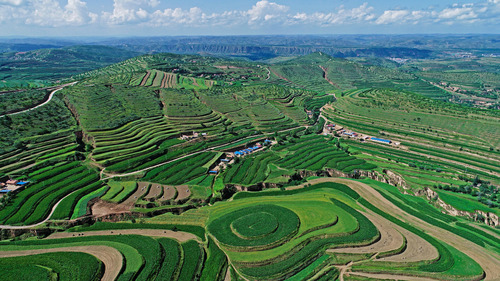
Aerial photo taken on July 16, 2018 shows the scenery of a terrace park in Pengyang County of Guyuan City, northwest China's Ningxia Hui Autonomous Region. (Xinhua/Wang Peng)
YINCHUAN, July 16 (Xinhua) -- With a few clicks on his smartphone, Ma Yufeng, 52, completed the purchase of drinking water for his family and three cows.
"Days of fetching drinking water from a faraway creek are gone," said Ma. "It once took nearly three hours to fetch water for one day's use by donkey, but now it takes only seconds for enough water for the whole month via the phone."
Ma lives in Xinwa Village of Pengyang County, an impoverished mountainous area in northwest China's Ningxia Hui Autonomous Region. The area suffers from serious water shortage, with only 335 cubic meters for per person, or one-sixth of the national level.
About 15 kilometers away from Ma's village runs a creek, which has nourished villagers for generations. It is seldom frozen in winter because villagers often have to break the ice and fetch water for daily use.
"Every family had to raise donkeys to carry water," Ma recalled. "I raised two, one for the water and the other for farming."
Ma was even more afraid of rainy days because he had to walk along a muddy path to fetch water.
"We must be extremely careful not to fall off the cliffs," Ma said. "It's true that water has borne the weight of life to us."
To address the water shortage, the county built a water supply network in 1983, pumping groundwater to back up villagers upon the high hills, which covers 156 villages including Ma's.
"Even so, because our villagers' houses are dotted in the mountains, it costs too much to manage, and it was too difficult to control the water supply and charge the fare," said Zhang Wenke, an official of the county's drinking water management station.
In 2016, a four-year governmental project was launched, providing over one million people in 44 counties and 603 villages in the south-central area of Ningxia with an annual water supply of about 39.8 million cubic meters.
On the basis of the project, Pengyang County further improved and expanded the old water network, installed intelligent water meters and realized automatic online monitoring and control of the drinking water for the villagers.
"We can monitor the water volume and quality at any time and place via our phones. Even a little leak will trigger an alert to inform us," said Tian Hao, a technician involved in the project.
Ma, a new smartphone user, is also amazed by the convenience brought by the internet. "I always check my phone for water usage," said Ma. "My family now has enough clean water to use, but we still won't waste a drop."
Internet technologies including data analysis and cloud computing have changed the way of water management in the county, saving half of the management staff and 1.2 million yuan (about 175,000 U.S. dollars).
Water, once a stranglehold for the county's development, finally set villagers free to make fortune by growing more crops and raising more cattle and sheep.
Donkeys, indispensable water carriers in the past, are seldom seen in the village nowadays.
Like many other villagers, Ma sold his two donkeys and bought three cows.
"Profits from beef have been high in the past two years, and our life is getting better and better," said Ma.
Thanks to the internet solutions to the water shortage, the county's per capita income has seen an increase of more than 2,000 yuan. In April, Pengyang County shook off poverty.
"We plan to invest more to combine the internet with the systematic water conservation so as to better benefit the villagers," said Zhang.



